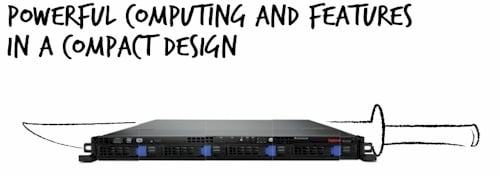Original URL: https://www.theregister.com/2011/02/13/nec_lenovo_server_tieup/
Lenovo, NEC eye server tie-up
ThinkExpress coming soon?
Posted in Channel, 13th February 2011 22:51 GMT
It looks like Japanese server maker and Chinese server wannabe Lenovo are going to be hooking up to create and peddle servers.
Speaking to Bloomberg in Tokyo, Masato Yamamoto, head of the platform business at NEC, said that Lenovo and NEC wanted to extend their PC deal to allow them to sell servers in China.
Yamamoto did not elaborate much, but he said that Lenovo had a "much smaller" business, in terms of units, than NEC, but was strong in China and particularly with government agencies. (I wonder how you separate a company from the government in China?) Yamamoto added that NEC had a much wider server portfolio than Lenovo has. And he also said that NEC wants to boost sales of servers and systems software by 6.5 per cent over the next two years to $5bn. (That's for the fiscal year ending March 2013, which is NEC's fiscal 2012 year end, and it does not include any incremental revenue that might come through a Lenovo-NEC server tie-up).
As El Reg previously reported in late January, Lenovo and NEC formed a joint venture called Lenovo NEC Holdings BV in the Netherlands, with Lenovo getting a 51 per cent stake and NEC getting 49 per cent, that will see the two merge their PC operations.</p.
Lenovo is paying NEC $175m to do the deal, putting its Japanese PC unit into the subsidiary, and NEC is dropping in its PC operations as well. Lenovo wants more of the PC action in Japan, and NEC must have figured that it was better to partner than to get into a bloody price war. Lenovo, with its lower Chinese manufacturing costs and large supply chain, was bound to win that war.
In February 2009, NEC shuttered its European PC business and farmed out the making of its servers as well for the region. Three months later, among heavy losses at the conglomerate, NEC pulled out of the $1.2bn "Project Keisoku" 10 petaflops supercomputer project. It has also backed away from its Itanium-based Express5800 servers and is now focusing heavily on its Xeon-based lineup.
And now, it looks like NEC wants to tap into the exploding server market in China, and the only way to do that quickly is to partner with Lenovo, which is technically located in Raleigh, North Carolina, but for all practical purposes is actually based in China.
For a few years after the IBM PC acquisition, Lenovo hired former IBM and Dell executives to run the business, but it is now run by Yang Yuanqing, the company's president and CEO before the IBM PC biz acquisition and its chairman in the wake of the acquisition. Hideyo Takasu, currently president of NEC Personal Products division, has been tapped as president and CEO of the joint PC venture between NEC and Lenovo. So it is starting out as a power-sharing arrangement. But if the PC biz gets ugly, perhaps thanks to pressure from smartphones and tablets, Lenovo could try to buy out NEC and asset full control.
Lenovo has made no secret of its desire to be a player in the x64 server racket. Beginning in early 2008, IBM inked a licensing agreement that allowed Lenovo to make and sell a range of low-end rack and tower servers that were essentially clones of IBM's System x boxes.
In September 2008, after successfully providing the back-end systems for the Beijing Olympics (something that IBM did for other Olympic events for decades), Lenovo began selling two rack and three tower servers that were indistinguishable from their IBM counterparts excepting the ThinkServer logo and some cosmetic changes to the chassis. IBM has never been clear about the manufacturing relationship between Lenovo and Big Blue, but everyone suspects that Lenovo is actually doing a lot of the manufacturing of System x boxes at this point in the Asia/Pacific market and very likely for other markets.
What the IBM-Lenovo partnership does not do, however, is give Lenovo a full x64-based server lineup to peddle. And that might be what a server hookup between NEC and Lenovo is all about.
The current Lenovo lineup is ridiculously skinny: two tower machines - the uniprocessor TS200v and the two-socket TD230 - and two different two-socket rack machines - the 1U RD230 and the 2U RD240. That's it.

Is IBM's server deal with Lenovo going to get the chop?
NEC, by contrast, has a much richer line of servers. The NEC Express5800 portfolio includes the 100 Series entry rack and tower servers, which have six machines using Intel's Xeon 5600 processors with one or two sockets plus slim workstation-mini server; the HA Series, which are not high availability clusters, but rather four-socket and eight-socket machines based on Intel's high-end Xeon 7500s; the ft Series of fault tolerant machines, which double up boxes and provide fault tolerant clustering at the hardware level; the SigmaBlade blade servers, which include a variety of Xeon blades plus storage and switch modules; the Eco Center line of energy-efficient, dense blade and rack servers; and the Itanium-based 1000 Series of enterprise servers, which are still supported using the old two-core Itanium 9100 series but which have not been updated with the quad-core Itanium 9300s launched early last year by Intel.
It is not tough to envision Lenovo dumping its partnership with Big Blue for four low-end servers and working out a deal with NEC for a much broader lineup. But the question is what does Lenovo need out of either IBM or NEC? If China can design good servers, it has the parts supply chain and manufacturing business and could easily ramp up. The answer is this. First, the partnerships give Lenovo political cover to expand into the American and Japanese markets. And second, partnerships give Lenovo access to IBM and NEC customers as well as their reseller channels. ®